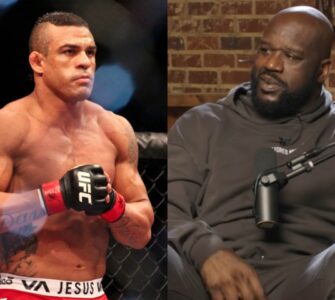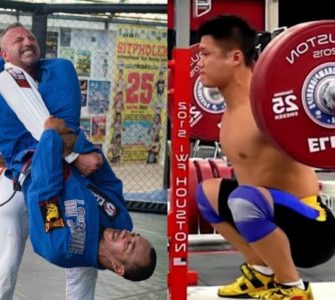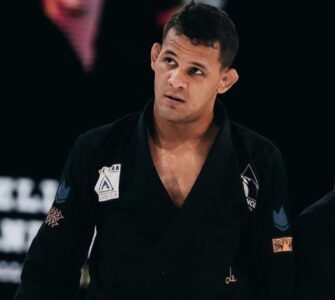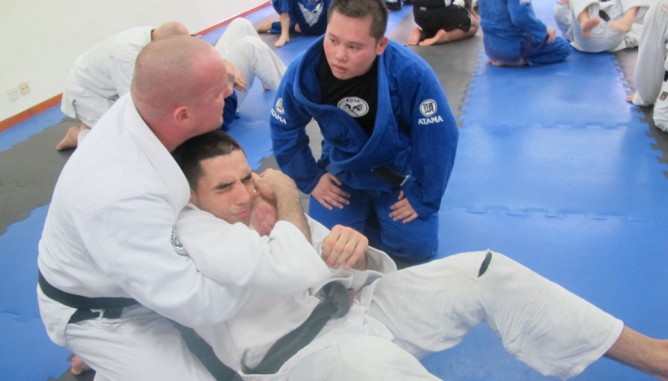
Source: our friends at jitssa.net (South Africa’s leading BJJ website)
Rodney King is currently a 3rd degree black belt under Rigan Machado, highest ranked BJJ practitioner in South Africa, and is one of the forefathers of South Africa Brazilian Jiu-Jitsu.
Hey Rodney, let me start off by saying it is an absolute privilege to have you on JitsSA.net. It seems that all roads in South African Brazilian Jiu-Jitsu lead back to you, a large majority of the prominent figures in South African BJJ were originally your students. Can you give our readers some insight into the origins of BJJ in South Africa?
Thanks for the invite. I started BJJ in 1996; a year later I brought my coach Rigan Machado to South Africa to conduct a seminar. It was at that seminar that I was awarded my blue belt. I travelled to the USA soon after that to continue my training at the Machado Academy. I also trained in Brazil with Alexander Paiva and others, it was a great time.
Back then there were only two people in the whole of South Africa coaching BJJ, myself in Johannesburg and Ludwig Strydom who lived in Cape Town. Ludwig was then a student of Rickson Gracie and as you know my lineage is the Machado’s. The Gracie’s and the Machado’s are cousins and they both grew up in the same house so the Machado’s were there from the beginning days of BJJ.
I became South Africa’s first BJJ black belt, and I am now a 3rd degree black belt under my coach Rigan Machado.
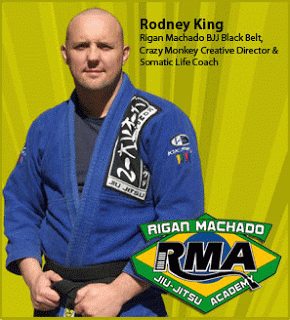
The popularity of Brazilian Jiu-Jitsu is on the rise with gyms opening up all across South Africa together with an increase in Brazilians relocating to South Africa to teach BJJ. What is your take on the current state of BJJ in South Africa?
I think part of the popularity is due to the rise in popularity of MMA. It’s kind of funny really, I have been coaching BJJ since 1998 and no one wanted to touch it then and now, as you note, everyone wants to train BJJ. I think the realisation has set in that having a ground game is essential in an MMA environment.
As far as Brazilian coaches coming to South Africa, I guess that’s natural too. As BJJ becomes more popular in South Africa, there are more business opportunities and BJJ, like it or not, is a business as well.
Many countries have developed federations for BJJ to govern the sport of Jiu-Jitsu and to govern the grading of BJJ practitioners. Do you believe that this is something that South Africa needs?
That’s a tough question. I wouldn’t want someone telling me how I should evaluate my students. I work on the old school way of grading students. Personally I don’t think someone should become a black belt in less than 10 years, I don’t care how good they are or how many competitions they have won. This shouldn’t be the only reason you are awarded a higher belt. Sure, you must have game, but more than that I feel having a black belt is a huge responsibility that must not be taken lightly. There is a certain level of maturity that is required to be a black belt and beyond that I want those who coach under the Machado name to be good people. They have to have social consciousness and the art for them has to transcend the fight. I am not sure any kind of federation can encapsulate or even enforce that.
With that said, I see a lot of people just being given belts. They bring one Brazilian out after another until they find someone who will just give them their next belt. The amount of jumping around from one instructor to the next is astounding and personally that is always a red flag in my books. People forget that like any sport there are unscrupulous people in BJJ too, just because someone is a black belt (and Brazilian) doesn’t make him a good person. Many of these guys will hand out a belt to someone here to secure their position in this country and to make sure that they will be brought out again. When I hear about people being awarded a belt on the first time they have met that black belt it really is worrying and sounds awfully a lot like a Mc Dojo scam. So a governing body to ensure that doesn’t happen, and that people who say they have belts in BJJ actually got them legitimately, may be a good idea. But then again with all the machismo and ego in South Africa, I doubt that will ever happen.
Brazilian Jiu-Jitsu is a highly strategic game with high level practitioners thinking many steps ahead. Some students struggle to develop their game to this point, what advice can you give to these students to break through this barrier?
Stop changing instructors, especially when things don’t go your way. Keep to one instructor and honour the process. Focus on training BJJ for more than just learning to tap people out. In my experience the people who focus on being the best normally are the first to quit. Keep away from the fancy stuff and focus on the fundamentals. As my coach Rigan always says, perfect the ‘uncomplicated game’.
What was the most important piece of advice that you have received thus far in your Brazilian Jiu-Jitsu journey?
My coach Rigan Machado always talked about the uncomplicated game. This piece of advice has served me well. Too many people chase the flash instead of focusing on the core fundamentals. In my experience this is the difference between the average and the excellent ones. Stick to a core game that is uncomplicated and make those fundamentals work at a high level.
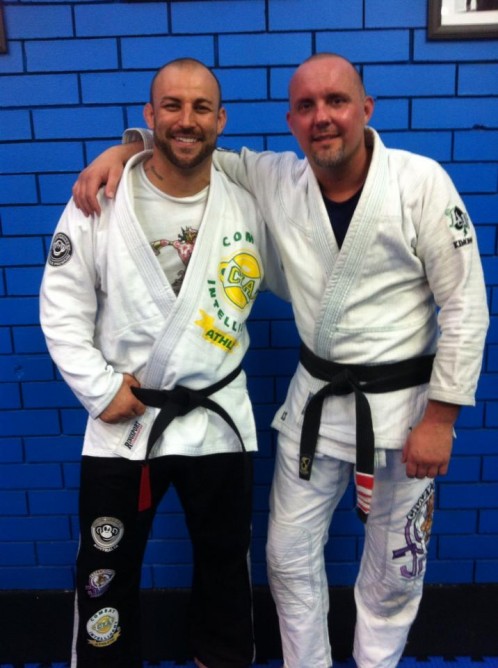
Professor Rigan Machado was world renowned for competing in BJJ, sambo and Judo. He has highly publicised fights with legends in grappling such as Rickson Gracie, Mark Kerr, Ricardo Morais and Jeff Monson. Do you feel any pressure for you and your team to compete in BJJ or MMA? In addition to that, do you feel that competing in BJJ and MMA is a constructive tool for the development of a BJJ practitioner?
One of the reasons I have stayed with Rigan for so long is because he never pressured me to be anything other than myself, and allowed me the space to work towards achieving my own personal goals and competition wasn’t one of them.
As far as competition being a constructive tool for a BJJ practitioner…yes and no. There seems to be this train of thought in BJJ, or more specifically in South Africa, that if you are not competing then you are not the real deal. It comes back to what I said earlier about the difference between effectiveness and excellence. If you like competing then do it, but competing doesn’t make you anymore of a real BJJ practitioner than someone who doesn’t compete. We need to get past this infantile notion that you are only a true MMA’er or BJJ practitioner if you are competing. A lot of this has nothing to do with BJJ but rather the desire to be noticed and for many guys an insecurity in their masculinity. They want to be feared, to be respected by other men etc. That kind of thinking is for cave men.
My friend Michel Jen, a BJJ black belt in the USA, doesn’t compete. Nor does he have the desire to. Yet he has tapped out numerous high level competitors that have visited his studio. Now just because he does it in his studio, not in front of a bunch of people and doesn’t publicize it, does that make him any less of a BJJ practitioner? Of course not!
I have a dozen friends who practice BJJ or MMA around the world who would on any given day wipe the floor with most people competing in these sports but you will never see them do it nor will you ever know their names. Simply, they don’t practice this to compete but rather to be a complete martial artist. This year I received my 3rd degree black belt from Rigan, while we were talking he even noted that competing is not necessarily the best way to experience BJJ but rather to enjoy the process.
So compete if you want to and if it is something you enjoy. But if you don’t then it doesn’t make you any less true to the art. In fact we have to remember that BJJ was first and foremost for self preservation, competition is only something that evolved afterwards as it became more popular.
You have successfully globalized your Crazy Monkey Defense system with 48 gyms in 15 countries around the world across 5 continents. What has been the key to the success of your self defense system?
High standards, honor, integrity and ethical behavior. Living what you tell other people to do. I rub a lot of people the wrong way as I am uncompromising in my principles. You can’t be a drug addict and then get on the mat and coach people, while telling them that BJJ is great for your health and will transform your life. Yet there are BJJ instructors like this in South Africa.
The reason we have been so successful is because when we hand out a belt people know they deserved it, and they didn’t just get it because they can tap everyone out in the room. They got it because they live the principles of BJJ, which is an art, and art means having balance between warrior and philosophy as I mentioned earlier. Our clients and coaches love the fact that we have a life performance approach to what we coach. That everyone is treated fairly, that we focus on our clients goals and that we expect them to be good people on and off the mat. No one is perfect and I am definitely not, but martial arts for me should always be a vehicle that leads to self mastery. In fact I wouldn’t be where I am today without martial arts. Right now we are the biggest martial art export this country has ever had, and I have been very blessed.
Equally we have been successful because we have created a training environment free from meatheads that are so prevalent in MMA and BJJ schools today. You can come in and have fun, challenge yourself without having to deal with people who are out to hurt you. In fact we will ask anyone to leave our school should we see them purposively trying to dominate or hurt people on the mat.
Even Karate, another art I have black belts in, makes two motivational distinctions in its approach to training, namely, Karate-do or Karate-jutsu. The former stresses psychological development while mastering the art, whereas the latter focuses on skilled application. Both are necessary to become a master of Karate, BJJ is no different in my mind.
What is on the horizon for Crazy Monkey Defense globally?
Right now I am working towards my PhD in Embodied Leadership. I have always had a dream of seeing martial arts rightfully take its place as an effective tool for personal transformation. All my efforts right now are focused on making that happen. I am working with some fantastic people in achieving this goal, from Dr. Christian De Quincey who is a world renowned philosopher who focuses on philosophy of mind and who I recently worked with to develop a world class mental game coaching program for modern martial arts. I am also working with Leslie Shwartz who is an expert in training life coaches and has a lot of experience in positive psychology. Next year Leslie and myself will be unavailing the world’s first martial arts life performance coaching program.
It seems like it is exciting times for Crazy Monkey Defense and JitsSA wishes you the best of luck through all your endeavours. To end the interview we like to ask a light hearted question. One of Rigan Machado’s most popular students was Chuck Norris, have you ever rolled with Chuck, and if so, how was it?
No I haven’t. I would love to though. But hey, no one can beat Chuck.



